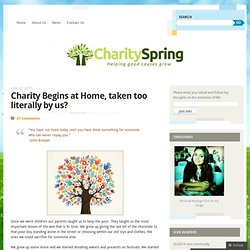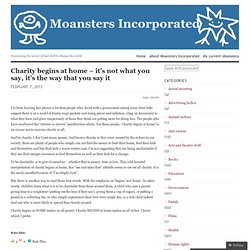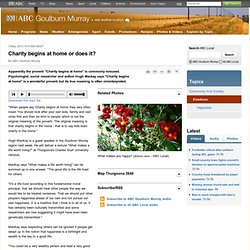

What people say to “Charity Begins At Home” 14/09/2013 at 4:59 pm.

What people say to "Charity Begins At Home" · Hans_Zomer. A teaspoon of adventure… Charity Begins at Home, taken too literally by us? “You have not lived today until you have done something for someone who can never repay you.”

~John Bunyan Since we were children our parents taught us to help the poor. They taught us the most important lesson of life and that is To Give. We grew up giving the last bit of the chocolate to that poor boy standing alone in the street or choosing within our old toys and clothes, the ones we could sacrifice for someone else. We grew up some more and we started donating sweets and presents on festivals. We looked for OUR “cause”, OUR “people”, OUR “place”, OUR “satisfaction”. Then why did we suddenly become so selfish that we chose to give to our Religion, Our Country, Our Cause and so for so many other “specific” reasons!
I like these words by Thomas Fuller- Charity begins at home – it’s not what you say, it’s the way that you say it. I’ve been hearing this phrase a lot from people who, faced with a government taking away what little support there is in a world of frozen wage packets and rising prices and inflation, cling on ferociously to what they have and glare suspiciously at those they think are getting more for doing less.

The people who have swallowed the “strivers vs skivers” misdirection whole. For these people, “charity begins at home” is an excuse not to exercise charity at all. And by charity, I don’t just mean money. God knows, thanks to this crisis created by the richest in our society, there are plenty of people who simply can not find the money to heat their home, feed their kids and themselves and buy their kids a warm winter coat. I’m not suggesting they are being uncharitable if they use their meagre resources to feed themselves as well as their kids for a change. To be charitable, is to give of ourselves – whether that is money, time or love. But, there is another way to read those four words. Charity Begins At Home But Cannot End There. Giving What We Can. Myth 1.

‘We already spend a vast amount on foreign aid’ The full picture: The amount the developed world spends is tiny compared with its wealth. In 2012, governments of developed countries spent $128 billion on foreign aid, and private aid from citizens added $56 billion. BUT: The total aid was only 0.4% of the combined national income of those countries, or four dollars out of every thousand.The total aid was only $152 per person living in developed countries.There are 5.84 billion people in developing countries, which means that the total aid was only $33 per recipient. People are often under the impression that a lot more is spent on foreign aid than it actually is. Myth 2. Global poverty is a massive problem, and aid certainly hasn’t made it disappear yet. Despite this, a lot has been achieved in the developing world: Smallpox was eradicated worldwide by 1980 following a World Health Organisation initiative launched in 1959.
Myth 3. Myth 4. Myth 5. Myth 6. Myth 7. Myth 8. Summary. If ‘charity begins at home’ why are we committing to overseas aid? 10/11/2010 at 11:41 am “But charity begins at home, and justice begins next door.” – Martin Chuzzlewit, a character by Charles Dickens It would be short-sighted to pitch the debate about Government expenditure as a choice between the poor at home and abroad, argues Hans Zomer of the ActNow2015.ie campaign In the public debate on Ireland’s current financial difficulties, from time to time voices are heard arguing that we cannot afford overseas aid in these times of crisis.

Using the ‘charity begins at home’ slogan, the argument goes that we must scrap overseas aid until such time that we have solved our own domestic problems. Attractive though this simple argument may seem, it is a false solution to a real problem. The commitment Ireland gave – as recently as September this year – to spend 0.7% of our gross national income (GNI) on overseas development aid by 2015, still only amounts to 70 cents in every €100. Charity Begins at Home? Charity begins at home or does it? - ABC Goulburn Murray - Australian Broadcasting Corporation. "When people say 'Charity begins at home' they very often mean 'You should look after your own kids, family and own circle first and then be kind to people' which is not the original meaning of the proverb.

The original meaning is that charity begins in the home - that is to say kids learn charity in the home. " Hugh MacKay is a guest speaker in the Goulburn Murray region next week. He will deliver a lecture "What makes a life worth living? " at Thurgoona's Charles Sturt University campus. MacKay says "What makes a life worth living" can be summed up in one answer. "It's a life lived according to this fundamental moral principal; that we should treat other people the way we would like to be treated ourselves. MacKay says respecting others can be ignored if people get swept up in the notion that happiness is a birthright and wealth is the key to a good life. "The point about human nature is that it is a bundle of contradictions we are all selfish and we are all selfless and altruistic.